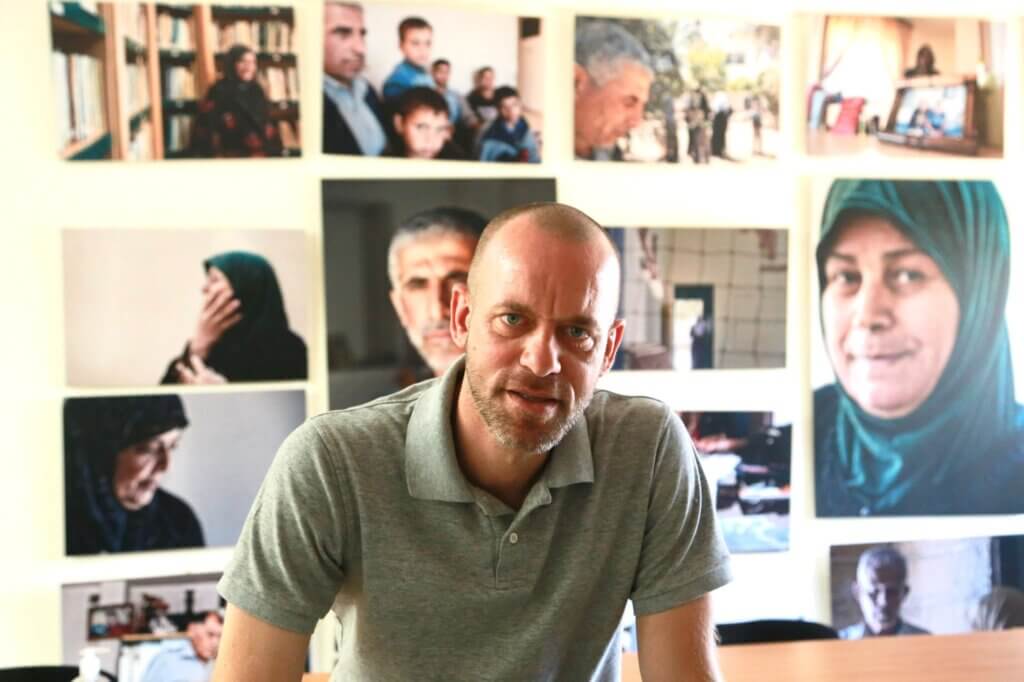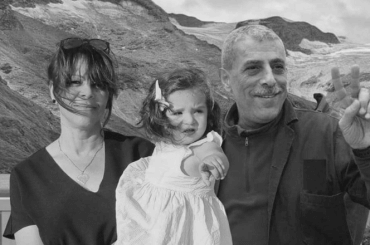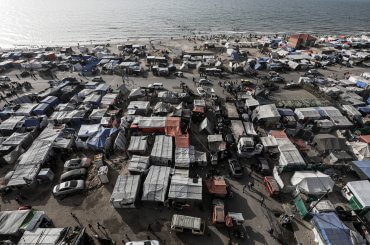In July, French-Palestinian human rights lawyer and defender, Salah Hammouri, wrote a series of letters from prison cell No. 4 in Ofer military prison. Hammouri continues to be held without charge or trial by the Israeli authorities, since his detention in March.
In one of his letters, Hammouri appealed to French president Emmanuel Macron to intervene against the grave injustice he faces from Israeli courts. Hammouri, whose father is Palestinian and mother is French, is not safeguarded or protected as a Palestinian in Jerusalem.
His appeal for intervention by his president, coupled with the lack of response, demonstrates Israel’s contempt and disregard for French authorities.
Hammouri was designated a high-security risk prisoner after the publication of his urgent appeal to Macron. As a punitive measure, he was chained from his hands and feet as he was forced to travel in the Bosta — a transportation system designed by Israeli authorities to mentally and physically break political detainees — while being punitively transferred to Hadarim Prison, north of Jerusalem.
According to a spokesperson of the campaign for Hammouri’s release, Hammouri is being held in “collective isolation,” where a select group of detainees are imprisoned together and separated from the larger prison population.
These words are one of the last he was able to write in Ofer. They are not from Hammouri the human rights defender, or the Palestinian lawyer who decided to challenge the might of the Israeli security apparatus while his own French government left him to the wolves.
Rather, these are the words of a young man, not yet 40, and the experience of unlawful and unjust imprisonment he has had to endure. It is a perspective written from inside the prison walls, ones which have seen hundreds of thousands of Palestinians pass through them, children included.
Salah Hammouri
July 2022– Ofer Prison
Until when will I hold the number 1124052?
Until when will we remain as numbers? Today, I carry the number 1124502. For 21 years I have carried the number 1124502. It is the number by which the “Israeli Prison Services” define my very personhood. It is the number which has followed me ever since my detainment as a child in 2001.
To those of us who have been arrested numerous times, this number has become a kind of barcode. It makes us feel we are no more than some manufactured goods for the prisons. Human products for consumption by every interrogation center and every prison, whether in times of war or peace, before a ‘cold war’ and after a war of attrition, during Oslo and after the Intifada (uprising). The only constant throughout this time is the ceaseless production of the prison’s human produce, with no expiration date.
“In some cosmic irony, the moment we enter prison our dreams begin to grow and broaden.”
Salah Hammouri from Ofer Prison, July 2022
This occupation does not see us, or treat us, as human beings with the right to live as free people do. Instead, it does all it can to asphyxiate the pseudo life we Palestinians live outside the walls of the prison. We must snatch small moments of life and joy between each detainment, whilst somehow coming to fear the short-lived joy and stability in our lives. Afraid of the next shock that will hit us, and of disappointments, we can no longer muster the courage to plan for a future that remains ever distant. An anxiety and instability looms over us and everyone surrounding us.
Despite all of this, and in some cosmic irony, the moment we enter prison our dreams begin to grow and broaden. First, we begin by regretting every moment of happiness and joy we did not make the most of whilst living in the world of freedom. Then, our dreams begin to intersect with the world we left behind. In moments, we imagine that after liberation it will be possible for our daydreams to meet with the world we left behind.
Perhaps the only explanation for this phenomenon is that, for us, the world stopped the moment we were detained. As such, we build for ourselves worlds of imagination, a reality of dreams. Yet, the more painful and difficult thing is our realization that as large as our dreams are, our reality narrows. Our dreams of freedom — women, friends, family — collide with our bitter reality. So we discover that the limit of a prisoner’s aspirations is that the prison guard forgets us for an extra five minutes during the 6:00 p.m. closure, or that one of us overhears a song on the radio that conjures memories of beautiful days spent beyond the prison walls.
One of the worst places a human being can be put in is prison. It is a place which resembles nowhere else in the world. It pulverizes us and flattens our dreams, aspirations, and hopes like the mashing down of an olive on the olive press. What I loathe most is the condition of waiting, one which is magnified inside prison. The incremental wearing down of the spirit in prison mirrors the way in which global warming is depleting the earth outside the world of the prison.
What goes through my mind these days is a question which has been eating at me. If I hate the condition of waiting so much — while only a few kilometers from my homeland, my freedom, and my city, Jerusalem — then what will waiting look like if I am to agree to be exiled from my home?
I know that the love of a homeland is an unrequited love, bringing only hurt, pain, and loss. It has robbed me of the most beautiful years of my life and stolen from me my adolescence and youth. It forced me to grow up quickly, living always beyond my years. Yet I love my homeland still, knowing that even if we do everything we can for it, our country will still only ask “what more can you give?”
It is a zero-sum-equation in the calculations of most people, and I understand this. But for me, a real life is not waiting at the station for the train of freedom to arrive, but being on the train itself, no matter the sacrifice.



I wouldn’t be surprised if the Israelis took the next step, tattooing him with his number.